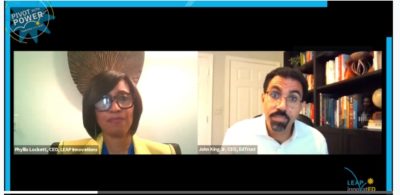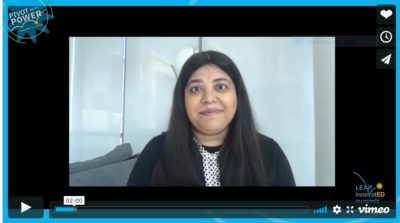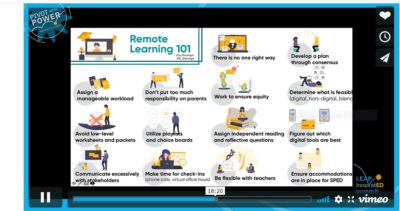Taking place September 1st and 2nd, LEAP Innovations, a Chicago based nonprofit that provides learning tools for educators and students, held their fifth annual InnovatED Summit. Done for the first time, virtually, the LEAP Innovations two-day experience encouraged educators to prepare for the upcoming academic year with keynote sessions and accompanying discussions.
 This year’s theme, Pivot with Power, had 500 registrants and covered five specific areas: There’s Power in Equity, Unleash the Power of Digital Learning, The Power of You: Harness Relationships to Build Resilient Learners, Lead with Power, Reflections on Leadership, Learning, and Agility, and Students are Powerful: The Power of Student Agency. Jessica Bee, Senior Marketing Manager, explained day one saying, “The first was about student agency, which came from the idea that students are powerful. In it, we examined how we can enable student agency despite not being in the classroom. The speaker for that session was a sociologist from New York, and they talked about the power of an agency. He challenged teachers to explore different ways to understand students’ interests and needs and build their learning around that because it helps foster that agency. As well as helping students to see themselves in future career goals and opportunities.”
This year’s theme, Pivot with Power, had 500 registrants and covered five specific areas: There’s Power in Equity, Unleash the Power of Digital Learning, The Power of You: Harness Relationships to Build Resilient Learners, Lead with Power, Reflections on Leadership, Learning, and Agility, and Students are Powerful: The Power of Student Agency. Jessica Bee, Senior Marketing Manager, explained day one saying, “The first was about student agency, which came from the idea that students are powerful. In it, we examined how we can enable student agency despite not being in the classroom. The speaker for that session was a sociologist from New York, and they talked about the power of an agency. He challenged teachers to explore different ways to understand students’ interests and needs and build their learning around that because it helps foster that agency. As well as helping students to see themselves in future career goals and opportunities.”
She later added, “We also talked about the power of digital money. In today’s world, you can’t teach without having a command of digital tools and applications. Our speaker, a former principal of a school in New York, explained how he took his students to the next level in terms of innovation and digital learning. He exposed educators to all of the ways they can maintain and make learning interesting through these digital applications. He shared tips, tools, and tricks that will help enable personalized learning and enable students to have more agency through the use of these digital tools. That took place on day one as well.” Following each session, there were live discussions to help educators understand how to use them and apply them in their settings.
Breaking down the key takeaways from the first day, Jessica states, “Some of the biggest takeaways were ways in which educators can foster student agency, and that how that can help students co-design and co-lead their learning despite them not being in their immediate presence. And the challenge, as well as the onus, is on educators to think about how those approaches apply in the digital and remote setting.” “Both of day one’s speakers touched on how educators can help students with agency and help them with empowerment. We believe that that will increase student engagement and just student retention in terms of their participation in the learning process,” she said.
 Day two’s sessions focused on equity, social-emotional learning, and leadership. Former Secretary of Education, John B. King, who served under the Obama Administration, talked about the need to lead with power. Jessica said that the key takeaway from that session was, “That this situation forces teachers to think about how education can be delivered differently. And how it can be customized around the students.”
Day two’s sessions focused on equity, social-emotional learning, and leadership. Former Secretary of Education, John B. King, who served under the Obama Administration, talked about the need to lead with power. Jessica said that the key takeaway from that session was, “That this situation forces teachers to think about how education can be delivered differently. And how it can be customized around the students.”
John also focused his session on a new deal for education. Specifically, after the Great Depression, there was a new deal for different social programs in the US, many Americans are still benefiting from in the present day. Jessica stated that John’s challenge to the audience was “a new deal for education that prepares students for a more digital future. And that now is the time to reshape our education system structure to remove those barriers of inequity.”
The second day also saw Robert J. Jagers, Vice President of Research from CASEL, the collaborative for academic, social, and emotional learning based in Chicago. In that session, he talked about the need to value students and their identities, which helps create a sense of belonging. The equity focus lens on the students’ social-emotional learning is supercritical and vital. Jessica says, “In our discussion group following that session, we asked teachers how they have been challenging themselves, their biases, and their identities, to help them bring their true selves to the classrooms. And how that helps them to be better educators for their students.”
LEAP Innovations, day two’s final speaker, Anurima Bhargava, former Chief of the Educational Opportunities Section of the Civil Rights Division at the U.S. Department of Justice, spoke on equity’s power. Bhargava stated that individual educators have to think about the practices that they foster. In that session, Jessica said, “Anurima encouraged educators to focus on who they call on, who gets discipline, which they consider smart and gifted. She also challenged them to check those biases and how they might foster conditions that alienate all students, especially students from our black and brown populations, diverse learners, and DLL learners. It was insightful to hear her talk about these systemic issues. But she left with this idea that there are things that educators in their spheres of influence, can do to help make sure that we aren’t driving these inequitable practices in schools and classrooms.”
 Though the Summit has ended, all the sessions from the LEAP InnovatED Summit are available online for on-demand viewing at summit.leapinnovations.org. Registration is required, but access to the content is free.
Though the Summit has ended, all the sessions from the LEAP InnovatED Summit are available online for on-demand viewing at summit.leapinnovations.org. Registration is required, but access to the content is free.
In addition to this year’s virtual summit, LEAP Innovations will be a collaborating partner for this year’s ASU+GSV Summit. LEAP CEO Phyllis Lockett will be joined by other panelists to explore how to prepare students to thrive in a shifting global economy. The day-long k-12 education summit will be held on October 8th from 11:00 AM-4:00 PM PT/2:00 PM-7:00 PM ET. Registration is free and can be found here.
Contributing Writer, Racquel Coral is a lifestyle writer based in Chicago. Find her on social media @withloveracquel.
